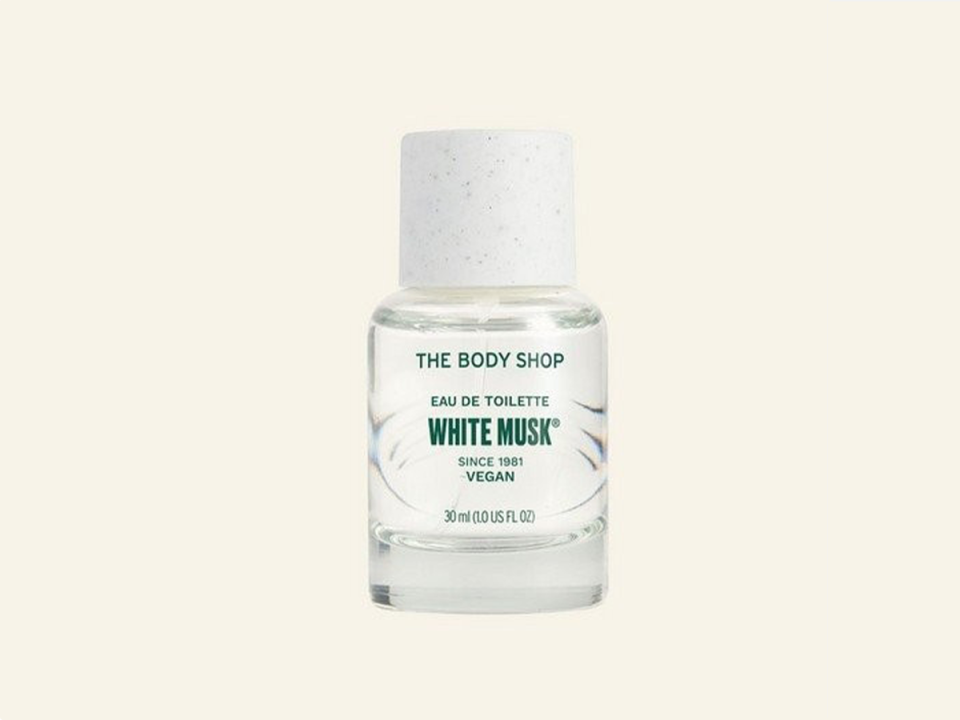Ode to The Body Shop: Can the cosmetics icon that gave us White Musk survive its latest crisis?

I still remember the first time I caught a whiff of White Musk on the breeze in the school playground. So floral; so clean; so… musky. It was different to the other body sprays we’d doused ourselves in as tweens – the sickly-sweet clouds of Charlie Red and Impulse. This complex aroma promised sophistication, grown-up parties with boys, and first kisses. It spoke directly to my nasal passages, promising that we weren’t in Kansas anymore, Toto: things were about to get technicolour.
What would the Nineties and indeed the Noughties have been without The Body Shop’s signature scent? As the olfactory backdrop to every noteworthy scene of our shared adolescence, it’s hard to imagine a childhood without it – so interwoven are my teenage memories with that unmistakable fragrance.
As it turns out, though, nostalgia doesn’t pay the bills. Following weak sales over Christmas and January, the chain is bringing in administrators, with some of its more than 200 shops almost certainly on the chopping block.
It’s sad news for a generation that grew up giving and receiving the company’s iconic products as emergency presents for every occasion. Whether Christmas, birthday or other, nothing quite fit the bill like a mango body butter or rose perfume. Whether shopping for your last-minute Secret Santa or your great-aunt Edna, whose tastes and desires remained frustratingly opaque to a 13-year-old with limited pocket money, The Body Shop beckoned irresistibly. Simply step inside the cathedral of smellies, and the world of catch-all, generic gifts was your oyster. The toughest part was choosing which to go for: kiwi lip balm; a handful of jaunty, fruit-shaped soaps; gift packs in flavours like “Dewberry” and “Peach Fuzz”; iridescent bath pearls that would leave weird globules of floating goop around the tub as they melted... Decisions, decisions!
Of course, the brand has evolved a lot since its inception in 1976 by environmental campaigner, human rights activist and entrepreneur Anita Roddick. At the time, it was a revolutionary idea: producing beauty products and toiletries made from ethically sourced, natural ingredients that weren’t tested on animals in simple, reusable packaging. The business grew steadily from a shop in Brighton to an international brand over the next three decades under Roddick’s watchful eye – three decades in which we collectively fell under the spell of White Musk. But in 2006 the company was sold to L’Oréal for a nine-figure sum, in a move that drew criticism from quarters arguing that The Body Shop was compromising its founding principles. A year after the sale, Roddick died from a brain haemorrhage, aged 64.
In some ways, the buyout was the beginning of the end for the chain’s ubiquitous popularity. Roddick had been such a strident, impressive figure that the brand became synonymous with her justice-questing personality. “Social and environmental dimensions are woven into the fabric of the company itself,” she once said. “They are neither first nor last among our objectives, but an ongoing part of everything we do.” With her out of the picture, what was The Body Shop? Just another high-street beauty brand making profits for faceless shareholders?

As Lush CEO Mark Constantine wrote in The Times, “L’Oréal moved manufacturing to the Philippines, where the margins were better, and marketeers discounted to create sales – and for a decade, that was the only message customers got. But you can’t cheapen everything, remove the values, and take more profit without the customers noticing and going elsewhere. They lost that feeling one got when buying a Body Shop product – that you were helping to change the world.”
You can’t cheapen everything, remove the values, and take more profit without the customers noticing and going elsewhere
Mark Constantine, Lush CEO
The whole aura of the formerly purpose-driven brand changed over the next 10 years, until L’Oréal wisely ducked out and sold it to Natura in 2017. This, too, went south, and the business was sold once again, this time in November 2023 to European private equity business Aurelius. The firm got it for a “bargain”, according to reports at the time, but even a good deal wasn’t enough to reverse The Body Shop’s ailing fortunes.
Perhaps it’s not surprising. In the time between Roddick’s tenure and now, other brands that prioritise people and planet have stepped in to fill the gap. Lush, for example, has become the new go-to chain for those looking to buy natural, cruelty-free cosmetics. Since it was established in Poole, Dorset circa 1995, the company has expanded into a portfolio of almost 1,000 shops in countries across the world.
It’s hard to know what hope is left for The Body Shop – but perhaps nostalgia is the key. In writing this piece, I stumbled across a Mumsnet thread called “90s Body Shop products they should bring back!” in which enthused users shared their most ardently missed products, from Ice Blue shampoo to banana conditioner. As for me, maybe I’ll do my bit and pick up a final bottle of White Musk – just for old time’s sake.


